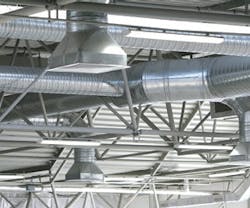What to Expect from HVAC Cleaning
HVAC cleaning obviously has a positive effect on indoor air quality, but this service might also shave a few decimals off of your building’s utility bill. It makes sense that HVAC systems filled with dirt and debris won’t run at full potential, so ensuring HVAC system cleanliness system is a simple, effective way to increase energy efficiency. (In fact, having a clean HVAC system can increase efficiency by up to 30 percent.)
Most experts suggest cleaning your system every 2 to 5 years, depending on the conditions that affect system functionality – things like pollen, dust, renovation work, and nearby construction.
When it comes to energy efficiency, a clean evaporator coil is most important. The system’s metal coil tubes can be drastically affected by dust and dirt. For example, when a building is air conditioned, the air flows across the cold coils. Over time, these coils become matted with dust and dirt, significantly reducing the system’s ability to cool the air. The system must work longer and harder to keep the building cool, ultimately costing more money to run.
Dust and debris build-up on system components, such as blower fins or ductwork walls, greatly decrease HVAC efficiency as well. These contaminants decrease airflow, resulting in more energy being consumed to provide the desired comfort level.
Proper Cleaning Guidelines
Before hiring a commercial contractor to clean your building’s HVAC system, know the proper guidelines and procedures. Follow this list:
- The technician should loosen contaminants using things like brushes, air whips, and compressed air.
- When contaminants are loosened, they should be collected using negative-pressure collection vacuum equipment.
- Negative-pressure equipment also prevents the spread of contaminants. If your technician follows National Air Duct Cleaners Association (NADCA) standards, no dirt or dust should escape from the ducts or spread out of the vents.
- Service openings may need to be created in the duct system to attach the vacuum and use agitation tools. These service openings should be professionally sealed once the cleaning process has been completed.
- When the ductwork is free of contaminants, the technician should turn his or her attention to the other components of the system, including the blower, the blower motor, air-conditioning coils, and external surfaces. Once the components are clean, the project is complete.
- Some service companies offer an antimicrobial chemical treatment, but this isn’t part of the typical cleaning process.
Who to Hire
When deciding which commercial contractor to hire, there are a few things to consider. Some states require licenses to perform HVAC cleaning and related work. Determine whether your state requires these licenses, and if the company you’re considering is in compliance. If you don’t know much about HVAC cleaning, you may want visual confirmation that the system has been cleaned. Most commercial contractors should be able to provide this visual confirmation (see HVAC Cleaning & Video Inspection, below).
NADCA members must meet a strict set of requirements, so making sure your contractor is a member is a good idea. NADCA members have to comply with cleaning standards and a code of ethics.
Aaron Marshbanks is on the board of directors for the National Air Duct Cleaners Association (www.nadca.com).
